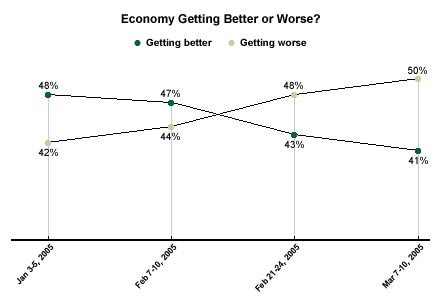Americans have become more pessimistic about the direction of the nation's economy. In Gallup's initial 2005 poll, 48% of Americans said the economy was getting better and 42% said worse. A more recent poll, conducted March 7-10, finds 41% say it is getting better and 50% say it is getting worse.

That represents a net shift of 15 points, from a 6-point net positive assessment (48% better, 42% worse) to a 9-point net negative assessment (41% better, 50% worse). Have all Americans become more pessimistic about the national economy, or are certain groups mainly responsible for the shift in opinion? An analysis of Gallup's Jan. 3-5 and March 7-10 polls* provides some answers.
Compared with their opinions in January, Americans in most demographic groups have become more negative in their assessments of the economy's course. Of the 30 groups analyzed, 27 now see the economy in less positive terms than they did in the early January poll.
The table summarizes the changes. The figures represent the net assessment of the economy (% getting better - % getting worse) for January and March, as well as the net change between the two periods.
Change in Ratings of Economy's Direction by Subgroup
|
|
January |
March |
Change |
|
|
|
|
|
|
Male |
+13 |
+2 |
-11 |
|
Female |
+1 |
-19 |
-20 |
|
|
|
|
|
|
White |
+16 |
-4 |
-20 |
|
Nonwhite |
-27 |
-26 |
+1 |
|
|
|
|
|
|
18 to 29 yrs old |
+3 |
+4 |
+1 |
|
30 to 49 yrs old |
+15 |
-8 |
-23 |
|
50 to 64 yrs old |
-1 |
-17 |
-16 |
|
65+ yrs old |
0 |
-14 |
-14 |
|
|
|
|
|
|
East |
-8 |
-19 |
-11 |
|
Midwest |
+1 |
-12 |
-13 |
|
South |
+18 |
-12 |
-30 |
|
West |
+10 |
+8 |
-2 |
|
|
|
|
|
|
Urban |
+6 |
-18 |
-24 |
|
Suburban |
+6 |
+7 |
+1 |
|
Rural |
+9 |
-28 |
-37 |
|
|
|
|
|
|
High school or less |
-1 |
-18 |
-17 |
|
Some college |
+8 |
-17 |
-25 |
|
College grad only |
+27 |
+17 |
-10 |
|
Postgrad |
+5 |
+2 |
-3 |
|
|
|
|
|
|
Income $75,000+ |
+14 |
+8 |
-6 |
|
Income $30,000-<$75,000 |
+13 |
-7 |
-20 |
|
Income <$30,000 |
-13 |
-31 |
-18 |
|
|
|
|
|
|
Conservative |
+27 |
+21 |
-6 |
|
Moderate |
+3 |
-21 |
-24 |
|
Liberal |
-21 |
-31 |
-10 |
|
|
|
|
|
|
Republican |
+58 |
+38 |
-20 |
|
Independent |
-19 |
-26 |
-7 |
|
Democrat |
-25 |
-44 |
-19 |
|
|
|
|
|
|
Employed |
+15 |
-3 |
-18 |
|
Not employed |
-4 |
-19 |
-15 |
The most change has primarily occurred among groups that had much more positive assessments of the economy's momentum in January. The largest shifts occurred among: rural residents (-37), Southerners (-30), 30- to 49-year-olds (-23), urban residents (-24), those with some college education (-25) and political moderates (-24). All those groups have moved from a net positive to a net negative assessment from January until now.
Relatively small changes occurred among suburban residents and Westerners. While that could indicate that economic conditions in those areas are good and staying that way, it could also be attributed to sampling variation given the smallish sample sizes of these groups. Other groups showing little change in their economic evaluations include nonwhites and younger Americans (18 to 29). Nonwhites were decidedly negative about the economy's course and remain so. Younger Americans were just slightly more optimistic than pessimistic in both January and March.
After the shifts in opinion, the following groups now are most optimistic about the economy's direction -- Republicans (+38), conservatives (+21), and those with a college degree but no postgraduate education (+17). Democrats (-44), liberals (-31), those in lower-income households (-31), rural residents (-28), independents (-26), and nonwhites (-26) are now most pessimistic about the nation's economy. Clearly, one's politics is related to his or her perceptions of the economy.
Bottom Line
Americans' views on the economy's momentum can be quite fluid, and the recent results reflect that. After relatively optimistic evaluations at the outset of the year, Americans by and large have grown more pessimistic in the past few months.
*Results are based on interviews with 1,005 adults, 18 and older, conducted Jan. 3-5, 2005, and 1,004 adults, 18 and older, conducted March 7-10, 2005. For results based on these samples, one can say with 95% confidence that the maximum error attributable to sampling is ±3 percentage points.
Margins of sampling error for subgroups will be higher.